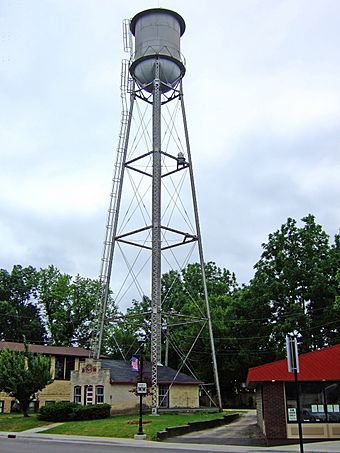Oregon Water Tower and Pump House facts for kids
Quick facts for kids |
|
|
Oregon Water Tower and Pump House
|
|

Oregon Water Tower and Pump House
|
|
| Location | 134 Janesville St. |
|---|---|
| Nearest city | Oregon, Wisconsin |
| Built | 1899 |
| NRHP reference No. | 07001097 |
| Added to NRHP | October 16, 2007 |
The Oregon Water Tower and Pump House is an old metal tower and a small brick building in Oregon, Wisconsin. It was built way back in 1899! This historic site was added to the National Register of Historic Places in 2007, which means it's an important landmark worth protecting.
Contents
Why the Water Tower Was Built
The Oregon Water Tower and Pump House were built in 1899. People in Oregon were worried about two main things. They needed better fire protection for their homes and businesses. They also needed a steady supply of clean water for everyone.
Changes Over Time
In 1921, the original wooden water tank on the tower was replaced. A new, stronger metal tank took its place. The tower continued to provide water for many years.
Becoming a Landmark
The water tower stopped being used in 1981. It was drained and taken out of service. After that, the village board decided to make the pump house and water tower special cultural landmarks. In 2007, both were officially listed on state and national lists of historic places. This means they are recognized as important parts of history. Many people see the tower as a symbol of downtown Oregon. It also represents what small towns across America are like.
How the Water Tower Was Built
The water tower stands about 100 feet (30 m) tall. That's like a ten-story building! It has four strong steel legs. These legs hold up a large steel water tank. This type of design was very common a long time ago. People sometimes called it a "classic tin man" style. It was first used in 1894.
The Pump House
Next to the tower is the pump house. It's a simple brick building with two rooms. Inside, there used to be a water pump. A gasoline engine ran the pump. This pump would push water up into the big tank. From there, water could flow to homes and businesses.
 | Georgia Louise Harris Brown |
 | Julian Abele |
 | Norma Merrick Sklarek |
 | William Sidney Pittman |


